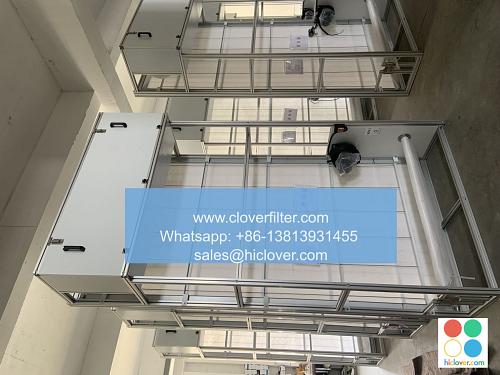The Role of Automatic Roll Air Filters in Maintaining Sterility in Vaccine Production

The production of vaccines requires meticulous attention to detail, particularly when it comes to maintaining sterility. One crucial component in ensuring the sterility of vaccine production facilities is the use of automatic roll air filters. These advanced filtration systems play a vital role in removing airborne contaminants, thereby preventing the introduction of microbial and particulate matter into the production environment.
Importance of Sterility in Vaccine Production
Sterility is paramount in vaccine production to prevent contamination, which can compromise the safety and efficacy of the final product. Contaminated vaccines can lead to serious health consequences, including the spread of diseases and adverse reactions. Therefore, maintaining a sterile environment is critical, and this is where automatic roll air filters come into play. By incorporating HEPA filters and ULPA filters into the production facility’s ventilation system, vaccine manufacturers can ensure that the air circulating within the facility is free from particulate matter, microbial contaminants, and aerosols.
Application Areas of Automatic Roll Air Filters
Automatic roll air filters have various application areas in vaccine production, including:
– Manufacturing facilities: These filters are used to maintain a sterile environment within the production area, preventing the introduction of contaminants during the manufacturing process.
– Fill and finish areas: In these areas, vaccines are filled into vials or syringes, and the air must be highly filtered to prevent contamination.
– Laboratories: Laboratories where vaccine components are tested and analyzed also require a sterile environment, which can be achieved using automatic roll air filters.
– Storage areas: Even in storage areas where vaccines and vaccine components are kept, maintaining a clean and sterile environment is crucial to prevent degradation or contamination.
Benefits of Automatic Roll Air Filters
The use of automatic roll air filters in vaccine production offers several benefits, including:
– Enhanced sterility: By removing airborne contaminants, these filters help maintain a sterile environment, reducing the risk of contamination.
– Increased efficiency: Automatic roll air filters can operate continuously without the need for manual intervention, making them more efficient than traditional filtration systems.
– Cost-effectiveness: Although the initial investment in automatic roll air filters may be higher, they can lead to long-term cost savings by reducing the need for manual cleaning and minimizing the risk of contamination-related losses.
– Compliance with regulations: Vaccine manufacturers must comply with strict regulatory requirements, including those related to sterility and contamination control. Automatic roll air filters can help manufacturers meet these requirements.
Future of Automatic Roll Air Filters in Vaccine Production
As vaccine production continues to evolve, the role of automatic roll air filters is likely to become even more critical. With advancements in filter technology and ventilation systems, these filters will play an increasingly important part in maintaining sterility and preventing contamination. Moreover, the integration of IoT-enabled sensors and smart filtration systems will enable real-time monitoring and optimization of air filtration, further enhancing the effectiveness of automatic roll air filters in vaccine production.
Conclusion
In conclusion, automatic roll air filters are a crucial component in maintaining sterility in vaccine production. Their ability to remove airborne contaminants, combined with their efficiency and cost-effectiveness, makes them an essential tool for vaccine manufacturers. As the demand for vaccines continues to grow, the importance of these filters will only increase, highlighting the need for continued innovation and advancement in air filtration technology to support the production of safe and effective vaccines.

